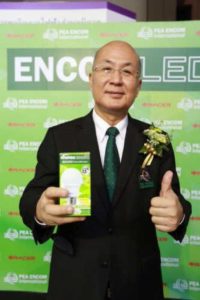
PEA ENCOM International, the wholly owned subsidiary of the Provincial Electricity Authority (PEA) in charge of renewable-energy and energy-saving business, is considering setting up its own manufacturing facilities for LED lighting products and solar panels at a total cost of between Bt300 million and Bt500 million, for the domestic market and export to neighbouring markets.
The company expects its revenue to surge significantly from Bt480 million targeted for this year to between Bt2 billion and Bt3 billion within five years, equally contributed by renewable-energy and energy-saving businesses. The growth will be driven by the domestic expansion of energy-saving products and services, as well as the overseas expansion for its renewable energy business with the setting up of power plants in Asia.
Punlop Pinyowiwat, acting managing director of PEA ENCOM International, told The Nation that the company was expanding its renewable-energy business to markets outside Thailand.
“We are trying to invest in renewable-energy power plants in overseas markets. We plan to invest in a 60-megawatt solar power plant, together with other solar power plants, in Japan with a joint venture with local Japanese and Thai investors. The projects in Japan will be concluded next year. We are also considering setting up solar power plants as well as other renewable-energy power plants in Cambodia,” he said.
Punlop said the company was also developing a mini-hydropower plant in Laos. It is also developing two solar power plants in Myanmar with capacity to produce 150MW and 200MW of electricity respectively. The projects in Myanmar will be conducted under joint ventures with local partners in that country.
PEA ENCOM International expects its revenue from renewable-energy and energy-saving businesses to reach Bt480 million this year, up from Bt40 million last year. The surge in revenue is being driven by the company’s four solar power plants in the Northeastern region of Thailand – two in Surin province, one in Khon Kaen and one in Loei.
“We are also in the process of developing a waste-to-energy plant in Maha Phram [tambon] in Ayutthaya. Costing about Bt1 billion, the project is now under the approval process of the Cabinet. Construction will begin next year and will be totally completed and start operations in 2018,” said Punlop, adding that this will be the government’s pilot project on waste-to-energy power plants.
Punlop said that the company had been set up in 2009 with the purpose of running two core businesses, renewable energy and the manufacture and distribution of energy-saving products and services.
He added that at that time, nobody was in the renewable-energy business commercially in the Thai market as it was quite costly to do so, such as the setting up of power plants using renewable sources. The company set up such businesses as it wanted to encourage new initiators in the marketplace.
As a state-owned company, PEA ENCOM International wanted to be a good reference for investors in power plants that did not create any pollution.
“Our mission is to be a leader in investing in renewable and energy-saving businesses. We are also considering other renewable-energy possibilities, including bringing wastewater from factories to produce electricity, so-called biogas power plants, as well as biomass power-plant projects,” he said.
Punlop said PEA ENCOM International was currently producing more than 10MW of electricity at its solar power plants.
“We want to increase our production capacity to about 100MW within the next five years. However, that requires between Bt60 million and Bt100 million in investment capital to produce each new megawatt,” he said.
He said renewable-energy business currently contributed more than half of PEA ENCOM International’s revenue. Thirty per cent is from energy-saving products and services, and the rest from maintenance services for power systems.
Through its energy-saving business, the company has provided many products and services, including LED (light-emitting diode) lamps and bulbs, energy services, and solar rooftops, which will be launched officially later this year.
The LED lighting products are currently produced by Racer Electric (Thailand) Co through a subcontract manufacturing agreement.
“We are considering the possibility of setting up our own manufacturing facilities, especially for LED lamps and bulbs, as well as solar-panel products in the next year or two. They will require a combined investment of between Bt300 million and Bt500 million,” Punlop said.
Source: http://www.nationmultimedia.com/business/PEA-unit-mulls-LED-production-30293366.html


